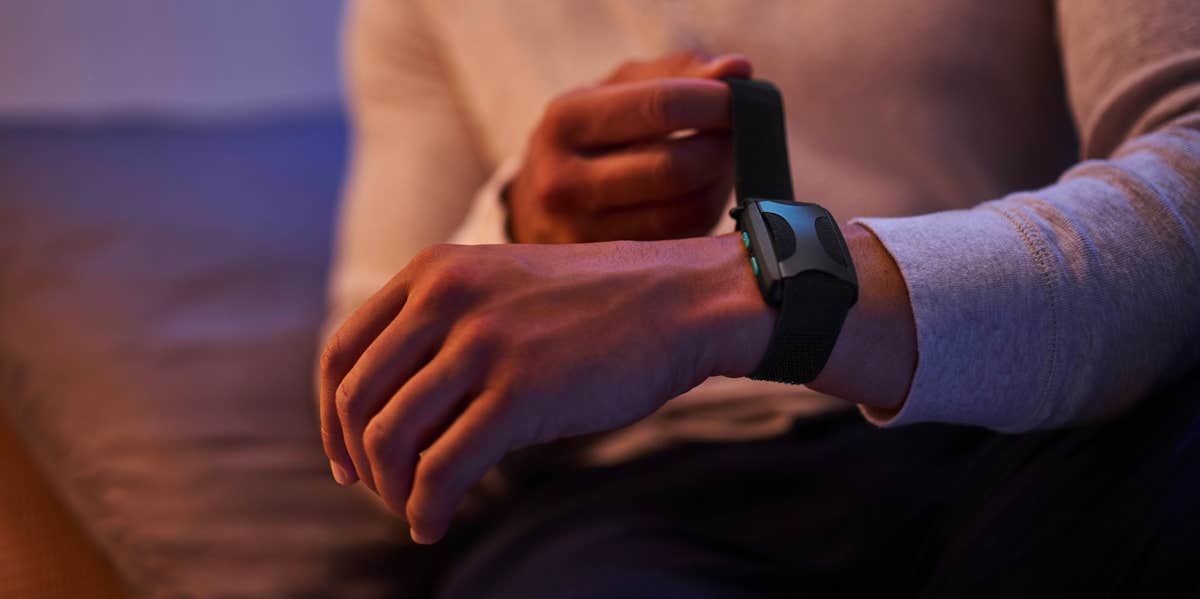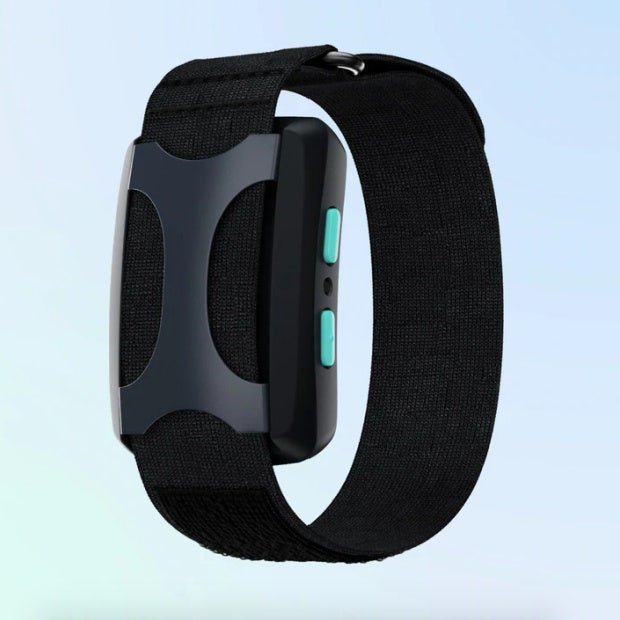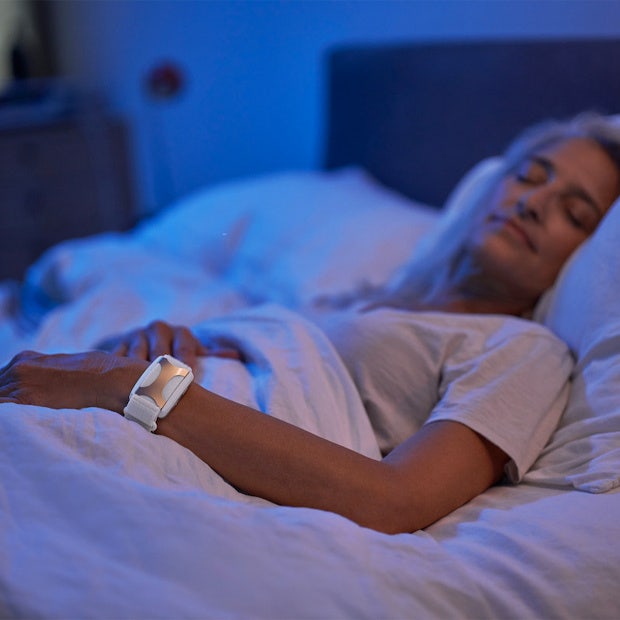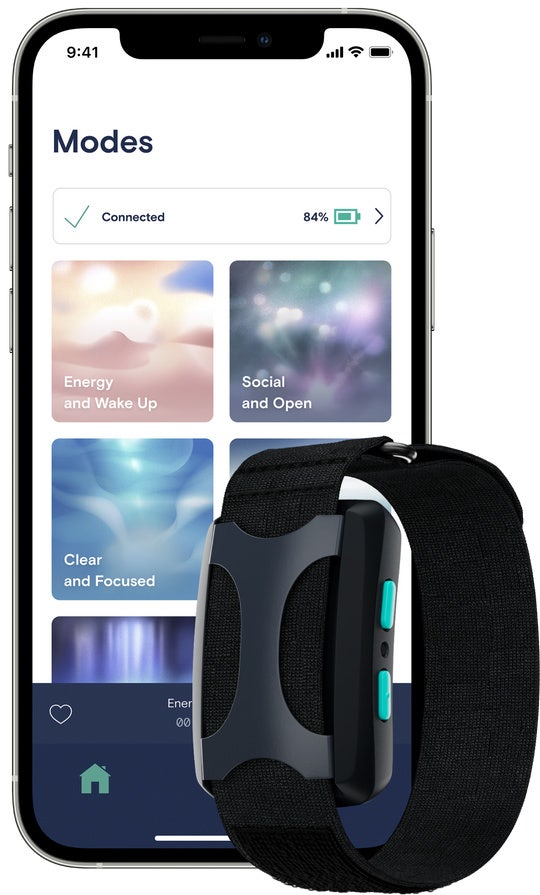An Easy Way To Relieve Stress When You Don't Have The Time
Say goodbye to restless nights.
 Apollo Neuroscience
Apollo Neuroscience For many people, sleep is but a dream — literally.
In a society that’s constantly on the move and full of distractions, getting a good night’s sleep is essential. Sometimes, even when people do manage to get some shut-eye, it’s one riddled with tossing and turning, so those eight hours don’t even feel like eight hours at all.
Lack of sleep can affect us in many ways. Not only can it take a toll on our moods, making us feel cranky and depressed, but it can also affect other parts of the body, as well as our mental health.
Because of this, it’s time to do something about those poor sleep patterns now and get back on track and, in many ways, get your life back.
That’s where the Apollo™ wearable comes in. Apollo sends soothing vibrations throughout your body to let your nervous system know you’re safe and in control, calming the mind and relieving stress levels to help you sleep better.
Developed by physicians and neuroscientists, Apollo’s unique technology is proven to improve heart rate variability (HRV), the key biometric of stress resilience. Healthy HRV levels lead to better sleep, focus, calm, and overall well-being.

Right now, the Apollo wearable is 10% off — meaning the end of your sleepless nights can be just around the corner!
5 Reasons Why People Can’t Fall Asleep
There are many reasons why people can’t fall asleep. Whether it’s an overactive brain as a result of stress, what we eat during the day, or even medications prescribed by doctors, there can be more than a few factors that stand in the way of a good night’s sleep.
1. Stress
Stress is a big reason why many people can’t fall asleep. For some, it doesn’t matter how many deep breathing exercises or relaxation techniques they do close to bedtime — they still can’t get their mind and body into a place where proper sleep quality can be attained.
Studies have even found that not getting enough sleep can increase cortisol levels, making your days even more stressful than they would be otherwise.
Between being stressed all day, then stressing out about not being able to sleep, a vicious cycle can be created that is difficult to break. In these cases, it’s important to find ways to reduce stress to get back on an even keel.
2. Anxiety and Depression
Anyone who suffers from depression and anxiety knows that they play a big role in getting a night’s worth of good sleep. Research has found that 75% of people with depression struggle to fall asleep, while those with anxiety and depression are more likely to suffer from nightmares.
While it should come as no surprise that anxiety and depression can affect your sleep, it shouldn’t have to be this way. Especially since lack of sleep can make depression and anxiety even more difficult to tackle.
3. Poor Sleeping Habits
Many, if not most of us, have poor sleeping habits that we really need to cut from our lives. If you think that scrolling on your phone is going to relax you before bed, you’re wrong. If anything, it’s going to add to stress and anxiety.
Although we tend to think our phones are harmless, the reality is that the screens emit blue light that can interfere with our circadian rhythm that is necessary to maintain a healthy sleep cycle.
A study published in the National Institute of General Medical Sciences describes circadian rhythms as “physical, mental, and behavioral changes that follow a 24-hour cycle. These natural processes respond primarily to light and dark and affect most living things, including animals, plants, and microbes.”
While circadian rhythms can affect stress hormone release, digestion, eating habits, and body temperature, where people really notice the effect is in their sleep patterns. So, using your phone before bed is a bad habit to break in order to improve sleep.
Naps, too. If you’re a napper, it can throw off your sleep cycle. You can’t expect to have a “quick” nap after work, then be ready to fall asleep for the night at 11 p.m. It disrupts the sleep cycle, and once that happens it can be difficult to find your way back.
4. Daily Diet Choices
Although we all probably grew up being told by our parents that we shouldn’t eat before bed and thinking it was just a way to pester us, it’s actually very true.
Research has found that eating food, especially a full meal, within three hours of going to bed won’t only affect the ability to fall asleep but stay asleep as well.
Not only can food affect sleep, but so can certain vices.
For example, studies have found that those who use nicotine not only struggle with increased sleep latency, but have increased rapid eye movement (REM) while sleeping. REM is the lightest stage of sleep. No one can wake up feeling refreshed without enough deep sleep under their belt.
Alcohol, contrary to the “nightcap” concept, can also negatively affect sleep. While one drink can provide short-lived stress relief after a long day, any more than that and you’re looking at a night of restless sleep. Why?
Because, as studies have shown, your liver is hard at work all night long metabolizing the alcohol. Your body needs to rest and digest the day, not overwork itself when it should be sleeping.
5. Medications
Although we can usually rely on an antihistamine to make us drowsy, not all medications have the same effect.
Some medications, even those that are prescribed by our doctors, can cause insomnia, an increased heart rate, or a slowed heart rate, as well as other side effects that can lower sleep quality. Some medications that affect sleep the most are SSRI antidepressants, alpha-blockers, beta-blockers, and corticosteroids.
Corticosteroids, in particular, which are prescribed to reduce inflammation in people with arthritis and similar ailments, stimulate the adrenal glands which are responsible for keeping the body’s fight or flight response in check. With those glands being exhausted by stimulation, sleep can be difficult to attain.
What is the best way to reduce stress to get a good night’s sleep?
With all these factors coming at us, some of which are hard to avoid, the Apollo wearable is the best option to help reduce stress and relax before bed.
Whether you wear it on your wrist or ankle, the stress-relieving device gets right to the heart of sleepless nights: the nervous system, by basically giving it the “hug” it needs to relax via touch therapy and soothing vibrations.

The Apollo wearable is proven to improve heart rate variability (HRV), the key biometric of stress resilience, which leads to better sleep, focus, calm, and overall well-being.
In studies, Apollo has been shown to help users experience, on average:
- 19% more time in deep sleep
- 40% less stress and feelings of anxiety
- Up to 25% increases in focus and concentration
How does the Apollo wearable device work?
The Apollo wearable works in tandem with a mobile app to help you transition through your day, with goal-oriented modes like Sleep and Renew, Clear and Focused, Relax and Unwind, Meditation and Mindfulness, and more.
Simply wear the Apollo device on your wrist or ankle, and select a mode in the Apollo Neuro mobile app that fits how you want to feel as you transition through your day. You can select durations between 15 to 120 minutes, in addition to the desired intensity, so you can customize your experience.
Before you know it, the Apollo wearable will be part of your daily routine and keep you — and your stress levels and sleep cycle — on track.

Over time, Apollo retrains the nervous system to adapt to stress more effectively, as the touch therapy rebalances the system, so you sleep better and wake up feeling more refreshed.
Unlike other wearable devices that boast a variety of results for different issues, Apollo doesn’t track your health. Instead, it actively improves your health in real-time by activating your parasympathetic “rest-and-digest” response so you can bounce back from stress more easily and quickly.
It’s a safe and non-invasive stress relief tool from which both adults and children can benefit. The more you use it, the better it works.
If you hop over to Apollo now, you can take advantage of their 10% off discount.
Isn’t it time to take control of your mental health and sleep better at night? It is! So don’t wake up groggy anymore. Put your well-being first with the Apollo wearable.
-Created in partnership with Apollo Neuro
Amanda Chatel is a freelance writer who has covered topics about mental illness, depression, anxiety, stress, and its effects on sleep and overall wellness for close to a decade.
YourTango may earn an affiliate commission if you buy something through links featured in this article.

